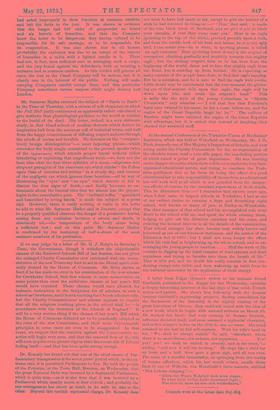At the annual Conference of the Yorkshire Union of Mechanics ,
Institutes, which was held at Wakefield on Wednesday, Mr. J. G. Fitch, formerly one of Her Majesty's Inspectors of Schools, and now acting under the Charity Commission for the re-organisation of the obsolete trusts, read a very able paper, the concluding portion of which raised a point of great importance. He was insisting on the danger of routine which there will be even under the very best- organised educational system, and trying to convince the York- shire gentlemen that so far from its being the effect of a good educational law to take responsibility off themselves, no educational law will work well at all which is not guarded from the danger- ous effects of routine by the constant supervision of fresh minds. This he illustrated thus :—" I remember that twelve years ago, when I first came to inspect schools in Yorkshire, I had as one of my earliest duties to examine a large and flourishing night school, well known to many of you, at Burley-in-Wharfedale. The chief manager of that school and his accomplished wife went down to the school with me, and spent the whole evening there, helping to give out the dictation exercises and the sums, and evincing the keenest interest in all the details of the examination. That school manager has since become very widely known and honoured as one of our foremost statesmen, and the author of the Education Act of 1870 ; but I shall not soon forget the effect which his visit had in brightening up the whole school, and in en- couraging the young people to exertion Half the work of life consists in digging up the fossil remains of dead systems and dead organisms, and trying to breathe into them the breath of life." That is ably put, and no doubt life really consists in first con- densing energy into habit, and then wakening up habit from its too habitual monotony by the application of fresh energy.


































 Previous page
Previous page